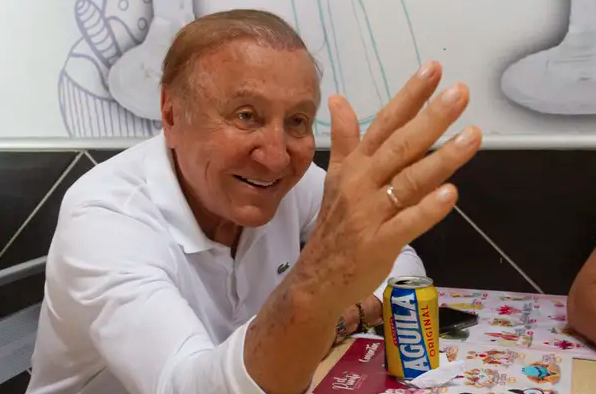Senator Gustavo Petro looked confident when he took the stage at the Tequendama Hotel in Bogotá. He reminded us of Jean-Luc Mélenchon when he took the stage to celebrate the excellent electoral performance in which he almost reached the second round of French presidential elections. From then on, France Insoumise became the center of gravity of the new left coalition called the New Popular Environmental and Social Union (NUPES). The Historic Pact must now also play a convening role, but with an eye toward the center.
In his victory speech, Gustavo Petro gave several messages that went in the direction of calling for a broader social pact, combining two key terms: “social justice” and “stability”. Thus, the candidate outlined an inclusive social investment proposal, based on a redistributive tax policy, which would improve the living conditions of the most vulnerable, and at the same time contribute to the stability and economic prosperity of the country and society as a whole.
Norberto Bobbio, in Left and Right, addresses the still persistent discussion on the left and right in politics, and introduces the concept of the “Inclusive Third”. He describes it as an alternative that goes “beyond the two opposites (left and right), encompassing them in a superior synthesis”. In polarized Colombia, this “Inclusive Third” can and must be Gustavo Petro.
They are not few analysts who consider that two “anti-system” candidates won, which conspires against the idea of Gustavo Petro being seen as an articulating actor. Although Petro is a “non-traditional” actor, he knows and has experience in the management of the Colombian political “system”. The fact that he has been a constituent and his consistent adherence to the 1991 Constitution is a strong sign of his commitment to Colombia’s institutional framework.
Petro has been senator, councilman, and mayor of the capital. In addition, his political party, the Historic Pact, will have an important bench in the next legislature. That is to say, his discourse of “inclusive third” is complemented with knowledge, experience, and political weight to turn alternatives into political consensus. Petro’s political background completely differentiates him from his opponent who has neither discourse, political presence, experience, nor knowledge.
There are, however, certain challenges. The Historic Pact was built with strong roots in social movements, which forms the platform that ultimately sustains it. Therefore, the Historic Pact’s call for social justice cannot be undermined or questioned by supporters. Let us not forget that one of the meanings of the Petro phenomenon as an alternative is the displacement of security as a central issue, a distinctive mark of Uribism, to the prioritization of social inclusion, especially of young people, as a legacy of social protests. But such displacement does not have to be at odds with the country of the private sector, the market, and entrepreneurship.
In theory, this challenge should not be so difficult to overcome were it not for confusion, prejudice, and bad intentions. The point is to insist that Petro does not represent a “radical left”. It is the social and political context of the region that makes him “radical”. As the candidate has said in several interviews, in a context such as the European one, it is likely that his proposals would be framed within the social democratic arc or even a sort of progressive liberalism. And in this line, the candidate has repeated that he will not “expropriate”.
Contrary to the failed attempts of the center coalition, which tried to attract the left and the right to a new proposal, it is Petro’s turn to pull the center and the right toward a better understanding of the challenges facing the country, and from a progressive perspective. The issue is to dismantle a state of denial, in which the sectors favored by the traditional political forces do not internalize the fact that Colombia must reduce the levels of inequality, that it cannot continue with the same extractivist model, and that it cannot continue to ignore its plurality. To build a country without invisible sectors of the population, “the nobodies”, as the vice-presidential candidate Francia Márquez has called them.
Undoubtedly, the most obvious and immediate challenge for Petro is that he faces a different opponent. Petro was prepared to compete with a sort of “Duque’s version”, but a Bolsonaro-Trump Colombian version emerged, who moved from Facebook and Twitter to TikTok, and who has two well-known props in the region: the anti-corruption discourse and the anti-politics discourse. The first is highly attainable and, definitely, a priority to make a change. The second is more complicated.
Petro has managed to capture the anger of the people with respect to the political elites, and part of his success lies in having had the ability to occupy that differentiating space. The right-wing is going to try to snatch that positioning from him by opting for the candidate of the so-called “right-wing populism” that sells the illusion of change. The central factor will be the communicational one and, from a rational point of view, candidate Hernández is, indeed, “a leap into the void”. However, the uribist branch, traditional parties, and business sectors will support him even knowing that he will endanger democratic institutionality.
In this short time, Petro must continue to insist that he is the one who represents the real change and who offers a real commitment to institutionality. In turn, Petro should highlight his experience in the management of the system, but accompanied by an ingenious and a daredevil communication strategy in the social networks to disrupt the Colombian Trump.
Translated from Spanish by Janaína Ruviaro da Silva











